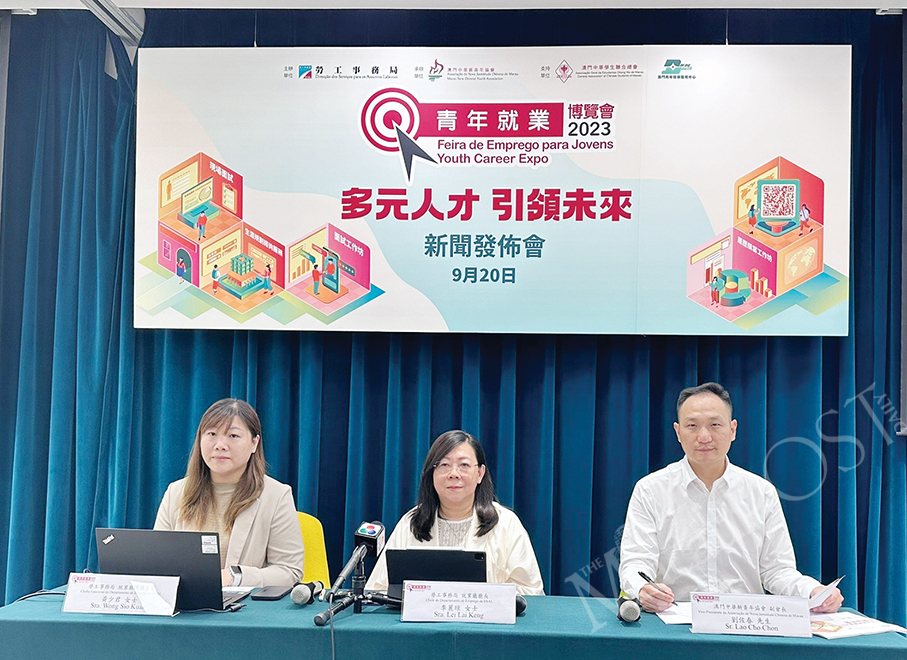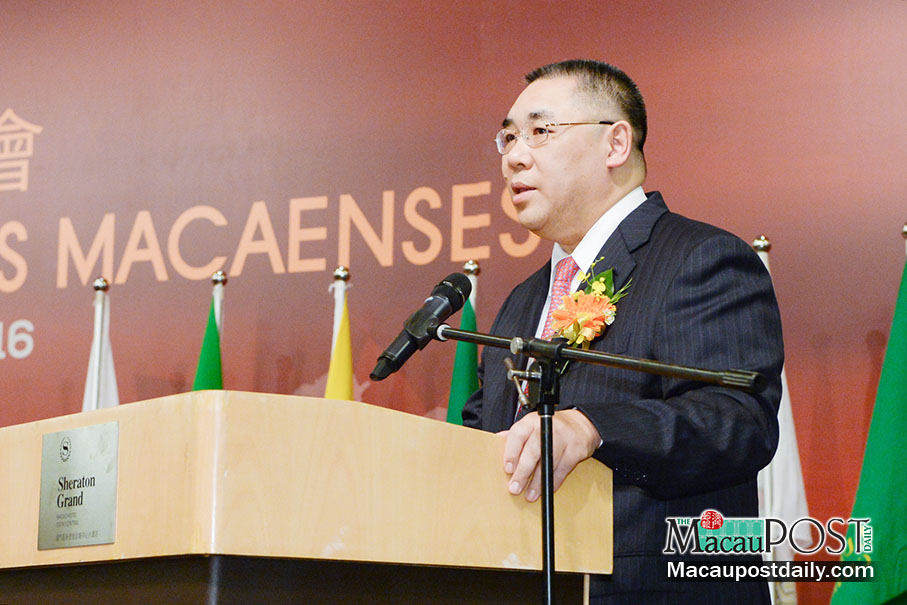The local government announced yesterday a string of new measures to strengthen the management of the city’s COVID-19 medical observation quarantine hotels, with the aim of preventing the novel coronavirus from entering the local community.
The new measures include 1) quarantine at different types of quarantine hotels depending on the arrivals’ respective risk levels; 2) the use of robots for providing contactless services to hotel guests in quarantine; 3) requirements to make a prior booking for a guestroom at quarantine hotels before departing for Macau; and 4) more frequent COVID-19 tests carried out during the quarantine period.
Yesterday’s announcement of the strengthened management came after Macau’s recent COVID-19 clusters which originated from medical observation quarantine hotels.
During yesterday’s regular COVID-19 press conference, details of the measures to strengthen and improve the management of quarantine hotels were announced by Liz Lam Tong Hou, who heads the Public Relations Division of the Macau Government Tourism Office (MGTO), and Health Bureau Control of Communicable Diseases and Surveillance of Diseases Department Coordinator Leong Iek Hou.
Lam underlined Macau’s achievements in COVID-19 prevention and control work thanks to the government’s mandatory hotel quarantine measure for those arriving from COVID-19 medium-risk and high-risk areas. Since the start of the COVID-19 pandemic early last year, around 53,000 people have cumulatively undergone hotel quarantine in Macau, Lam said, adding that a total of 12 medical observation quarantine hotels were operating during the peak – which was in March last year – when around 5,000 people were undergoing their respective quarantines at the same time.
Lam said that a total of 25 COVID-19 positive cases (22 confirmed cases and three “re-positive” cases) were detected when the patients were undergoing their hotel quarantine, which she said has been highly conducive to the prevention of a COVID-19 community transmission in Macau.
Macau has not recorded a new local COVID-19 case for 33 consecutive days after the latest case was confirmed on October 9. Macau’s COVID-19 tally stands at 77, without any fatalities. The 77 cases comprise 60 imported cases and 17 cases “connected to imported ones”.
Since the COVID-19 pandemic, Lam noted, a hotel can only be used as a quarantine facility after Health Bureau engineers have concluded that the respective hotel’s ventilation system has been modified in a way that meets the official specifications required for a quarantine hotel. When a medical quarantine hotel starts operating, MGTO and SSM officials brief the top management members about the official COVID-19 requirements, Lam noted, adding that all staff members can only start working at a quarantine hotel after undergoing training for infection control measures. Lam also underlined that MGTO and SSM officials have been inspecting the city’s quarantine hotels regularly to ensure that they are operating in line with the official COVID-19 requirements.
Lam said that in the wake of the detection of a quarantine hotel security staff cluster in late September, MGTO and SSM officials and those from other public entities that are covered by the Novel Coronavirus Response and Coordination Centre had held meetings to discuss and review the operations of the city’s quarantine hotels with the aim of identifying problems that posed risks to the COVID-19 safety of the local community.
Leong said that after comprehensive reviews of the operations of the city’s quarantine hotels, the Health Bureau has identified certain problems that were adversely affecting the city’s COVID-19 prevention and control work. After gathering opinions and suggestions from residents and officials from other relevant public entities involved in the operations of quarantine hotels, Leong said, the Health Bureau has now come up with five major measures to strengthen and improve the management of the city’s quarantine hotels.
Firstly, Leong said, the Health Bureau has clearly defined functions and duties with which the different public entities involved in the operations of quarantine hotels are tasked. Health Bureau officials have drafted a more rigorous set of guidelines on COVID-19 prevention and control for those working at quarantine hotels, Leong said, adding that the bureau will also strengthen its training of staff members in quarantine hotels for infection control measures.
According to Leong, MGTO officials will be tasked with ensuring that quarantine hotels will always implement COVID-19 measures and guidelines required by the Health Bureau. MGTO officials will ensure that all staff members of quarantine hotels will undergo COVID-19 nucleic acid tests (NATs) regularly and that hotel managers will always carry out “closed-loop management” measures for staff members working in COVID-19 high-risk positions.
Leong said that Public Security Police (PSP) and Macau Customs Service officers will strictly carry out their law enforcement work to ensure that those undergoing hotel quarantine will always comply with the official COVID-19 medical observation requirements. The law enforcement officers will ensure that those in quarantine will not leave their respective guestrooms, Leong said, adding that the officers, stationed in the city’s quarantine hotels, will take immediate law enforcement actions on those who have violated the official COVID-19 rules.
Secondly, Leong said, those arriving in Macau from areas affected by COVID-19 will transferred to different types of quarantine facilities for their respective medical observation. According to Leong, those who have been identified as having a “very” high risk of having been infected with COVID-19 will be transferred to the Health Bureau’s Public Health Clinical Centre in Coloane, while those arriving from COVID-19 high-risk areas will be transferred to “special” quarantine hotels – a new type of quarantine hotel, and those arriving from COVID-19 medium-risk areas will be transferred to other quarantine hotels.
Thirdly, Leong said, those arriving from COVID-19 high-risk areas will have to undergo a COVID-19 nucleic acid test (NAT) every day during the first 10 days of their quarantine periods, with the aim of detecting those who have really been infected with COVID-19 as soon as possible.
According to Leong, the fourth major measure has now been implemented, according to which all quarantine-hotel staff members working in COVID-19 high-risk positions are subject to “closed-loop management”, which means that they are not allowed to enter the local community while on duty and even for a period of time after leaving their COVID-19 high-risk positions.
Fifthly, Leong said, requirements for arrivals to make a prior booking of a guestroom will be implemented for all quarantine hotels in the city.
“Special” quarantine hotels
Lam pointed out that the city’s quarantine hotels currently comprise two types, namely 1) government-designated hotels, and 2) hotels of the respective arrivals’ choice (aka self-selected hotels).
Lam said that a new type of quarantine hotels – “special” quarantine hotels will be set up, which will be used for those arriving from COVID-19 high-risk areas.
Lam said that after an assessment with health officials, MGTO officials have decided that the Treasure Hotel will be used as a “special” quarantine hotel, where renovation and maintenance work is being carried out so that the hotel will meet the official specifications required. Lam said that currently those arriving in Macau from COVID-19 high-risk areas refer to those who catch a flight or a connecting flight from Singapore to Macau, who will be transferred to the Treasure Hotel, which she said was expected to come into use before the beginning of next month.
Robots
Lam also said that robots will be set up at the city’s quarantine hotels to provide contactless services to those in quarantine, with the aim of minimising the contact of staff members working in COVID-19 high-risk positions with the guests. The contactless services will include temperature checks, disinfection, and delivering necessities and other items to the guests.
Lam said that the robots are being tested, adding that they will come into use at the “special” quarantine hotel – Treasure Hotel – first before being available at other quarantine hotels later.
Prior booking
Lam also announced that from Saturday next week, all those – regardless of locals and non-locals – who are required to undergo hotel quarantine upon arrival in Macau will have to present a document confirming that they have booked a guestroom at a quarantine hotel, when checking in for a flight to Macau or boarding a shuttle bus (aka Golden Bus) from Hong Kong to Macau via the Hong Kong-Zhuhai-Macau Bridge (HZMB).
According to Lam, the guests concerned can now start to book a self-selected hotel, while they can start to book a guestroom at government-designated hotels on Monday next week. The commencement of bookings for the Treasure Hotel will be announced in due course, Lam said.
‘Very’ high-risk people
Replying to media questions, Leong said that those who will be transferred to the Public Health Clinical Centre due to having a “very” high risk of having been infected with COVID-19 refers to those who have been infected with the novel coronavirus disease within the past three months but have recovered from the disease. Leong said that they are classified as having a “very” high COVID-19 risk because they are likely to test positive for the virus again in a nucleic acid test for a period of time after their recovery – i.e., “re-positive” cases.
Leong also explained that those arriving from Hong Kong, Taiwan, and areas affected by COVID-19 in the mainland will be transferred to other quarantine hotels – i.e., they will not be transferred to the Treasure Hotel which will be used as a “special” quarantine hotel.
This photo taken earlier this year from Big Taipa Hill shows the Treasure Hotel (right) and the adjacent Golden Crown China Hotel. Photo: Tony Wong






